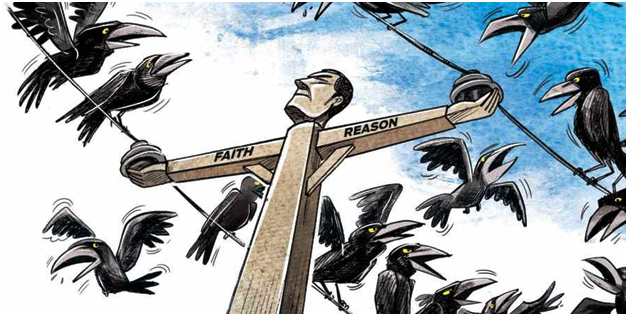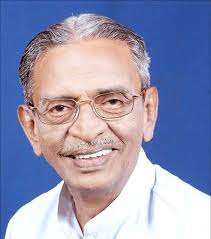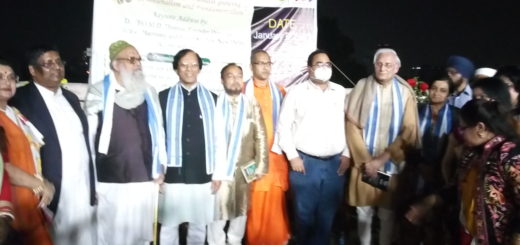Don’t mix religion and politics! People should be better than sheep

In New Indian Express
01st February 2019

Valson Thampu
Custodians of faiths who assert the irrelevance of rationality to the religious domain do so to insulate themselves from accountability.
Note: Faith begins where reason ends; faith is above reason; faith and reason run in parallel line, the twin shall never meet! The basis for Faith is blind reason, Reason is guided by enlightened reason. Both are in different domains, comparing them is odious, like comparing Chalk and cheese!, as oil and water don’t mix.
Drivers know it; they use, dim light, normal light or head light to see far. Beyond headligaht it is all darkness. Venturing into darkness may land you in a ditch, impossible to get. Even so for normal living we should go forward only so far as our light of reason permits! Not beyond.
Driving Example!
For limited humans wanting to reach for the unreachable and unlimited, both Reason and Faith are necessary. For humans going at 80 mile speed, it is risky to rush into darkness(Faith) because he may be dashing into a concrete wall or falling into a ditch.
Accountability, transparency and public order are possible when it is defensible by reason, by universally accepted clarity and criticism. That is why politics and religion don’t mix; hence state governments are all secular, while religions and fiath are confined to personal or family life. We are facing this problem while mixing Faith and Religion related Sabarimala or Ramtemple issues. States must be ruled by the country’s secular constitution, not by personal or private religious codes of conduct.
You may be vegetarian or non-vegitarian, red, blue or yellow dress, as long as you don’t offend or impose them on others. This is what our writer Valson Thambu also tries to convey. james kottoor, editor CCV.
Please read below Valson’s article in New Indian Express
It is easy to see why custodians and protagonists of religion insist on the incompatibility between faith and reason, faith and facts. This incompatibility is posited in hierarchical terms — asserting that faith is above facts. By implication, matters involving religion should not be subjected to the regulating function of reason, for faith supersedes reason. Reason stands at the dividing line between what we may, or may not do, especially in the public domain.
This precipitates the issue of relative authority of faith and reason. When more than one locus of authority is at work, the question of hierarchy emerges in the practical sphere. That is because experience — our thinking, doing and knowing — demands coherence. Being split along two parallel lines that never meet — faith and reason being so understood —is disruptive of coherence, which frustrates understanding. That is because the human predicament involves faith and reason at all times. One realm — say, that of faith — is incomplete and incoherent without the other. No religious action is, strictly speaking, possible without the guiding light of reason. Faith, in turn, needs the restrictive function of reason, if the life we lead is to be free, progressive and coherent. Unlimited freedom, like faith without reason, degenerates into anarchy. Restraint without freedom becomes oppression.
The proponents of the ‘faith-above-facts’ hypothesis are motivated by the desire to liberate their authority from restraints of all kinds, unmindful of what it entails for others, their community and even themselves. Though this may seem an exhilarating stand short-term vis-a-vis those external to one’s community, it is not a sustainable stand in respect of issues internal to that community. What is presumed to be liberative externally proves to be oppressive internally.
A third issue in this regard pertains to the admissibility of religion as supra-rational into the public sphere. Can any public advocacy — religious, political, cultural — be deemed as tenable in public, if it is not coherent to the people at large? Do I have, in other words, the right to bring into the public domain esoteric claims and dogmas that do not make sense in public? (The answer is implied in the conditionalities governing Article 25 of the Constitution pertaining to freedom of conscience.) It has been deemed axiomatic, especially since the Enlightenment, that public advocacies must be subject to rational scrutiny.
The hallmark of the reasoned soundness of an advocacy is its openness to public criticism. Tolerance of dissent is, hence, the essence of the rational. Any advocacy surcharged with intolerance is inherently suspect. It is when the proponents of a cause are unsure about the defensibility of what they advocate that they become stridently assertive and violently resentful of rational scrutiny.
When rationality is excluded from the practice of religion, two dangers emerge. First, the religiosity that pretends to be supra-rational degenerates internally. Once the ‘restraint’ of reason — its limiting and regulatory function — is removed, the internal life of a religious community begins to degenerate, especially in its moral content. Those who vehemently assert the irrelevance of rationality to the religious domain do so everywhere to insulate themselves from accountability and transparency.
The supremacy of faith becomes, in effect, an impregnable fortification around themselves. The exercise of authority needs to be inscrutable only when it is indefensible. If the members of a faith community have any discernment, they will realise that custodians of their community of this kind undermine the integrity and wholeness of their religious life. Any tendency to divorce the ritualistic life of a religion from its ethical core — using the former to eclipse the latter — is a sign of internal rot.
It should be easy to see through this, but more often than not, it isn’t. The reason is that those who undermine a religious community from within, keep the attention of the people concerned deflected from the internal rot to presumed external threats to their religion. The second issue immanent in packaging faith as a supra-rational entity is that it erects a potentially anarchic confrontation between religious fervour and public order. Once this pre-democratic mindset is activated, rabid intolerance of critical views, irrespective of their soundness, becomes the hallmark of ‘believers’. Intolerance begins to be misconceived as a religious duty.
In the Christian lingo, the fold of believers is called ‘sheep’. It never fails to surprise me why people feel flattered by this insult. Priests refer smugly to their congregations as ‘my sheep’, in a matter-of-fact fashion! This is possible because the religiosity in which the ‘sheep’ are conditioned is so hardwired that the mere awareness of religion makes them regress by some 2,000 years. This is most regrettable. People should be better than sheep. It is a self-insult to follow priests like sheep following shepherds. They must assume responsibility for being rational creatures, lest they are degraded and used as mere tools to subserve interests that promote priestly vanity, but are hugely harmful to their freedom, dignity and empowerment.
True secularism is not anti-religious. It discounts only irrational religiosity, and must do so uncompromisingly. Vigilant resistance to random outbreaks of irrational religiosity — which makes religion the last resort of scoundrels — is basic to evolving a secular-democratic culture, marked by scientific temper and responsible thinking. It needs to be deemed a patriotic duty by all citizens.
Valson Thampu is a former principal of St Stephen’s College, New Delhi. His Email is: vthampu@gmail.com)

















